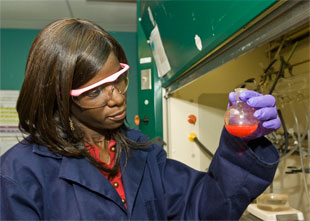
"Simplifying the complex biomolecules would enhance finding the biomarker. By detecting it earlier, we can start treatment earlier.”
April 05, 2013
Colleen Scott passionate about her research, teaching
Like many of you, cancer has touched my family. Colon cancer claimed my Mom; I lost my Dad to leukemia.
But the work Colleen Scott is doing in her chemistry lab at SIU may provide new hope to those with cancer, and their families.
Colleen knew as a high school student in Jamaica that her future was in the sciences. As a runner, she also saw a future as a track athlete. So did Auburn University, which offered her a track scholarship.
After receiving her chemistry degree from Auburn – she was the first of the five children in her family to earn a degree -- Colleen was accepted for the doctoral program at the University of Pittsburgh.
“That was a turning point for me. At Auburn, I was able to manage track and school. When I got to graduate school, it wasn’t as easy. But the biggest challenge for me wasn’t just school, it also was because I wanted to run professionally. “
Her adviser “didn’t say yes and he didn’t say no.” So for four years, Colleen ran professionally and attended graduate school, earning her doctorate in 2005.
It was husband Andre’s career that brought both of these talented individuals to SIU. Andre became an assistant track and field coach in 2004. Following the birth of their son Sterling the next year, Colleen joined the chemistry and biochemistry department in 2006, teaching part-time and conducting her post-doctoral work.
She became an assistant professor in 2010, and she is a devoted researcher and teacher.
One of her promising research projects is the development of an analytical tool to rapidly separate and identify protein mixtures.
“This is extremely important for cancer research when you are looking for a particular protein, or a potential biomarker. If you are looking for a biomarker, and you have removed a complex mixture from a patient that has a complex mixture of biomaterials, we want to be able to separate them quickly. This normally takes months. But we potentially can do this in a day or two. That is the power of what we hope to develop.”
One of the reasons this is such a passion for Colleen and her colleagues was the loss of fellow Professor Daniel Dyer to brain cancer in 2010.
“One of the problems with the cancer he had was not much is known about it, and the biomarker for it isn’t well known. Simplifying the complex biomolecules would enhance finding the biomarker. By detecting it earlier, we can start treatment earlier.”
Colleen is also working on the development of dyes for imaging of cells as well as developing a “scaffold,” or structure to grow and monitor nerve cells.
When she’s not in the lab, she is in the classroom, helping to train the next generation of scientists.
“I love to teach. It’s a calling; it’s something that comes naturally to me. The biggest part for me is engaging the students. I enjoy finding out about them and how I can help them in their education.”
That is the hallmark of our faculty. In the classroom and in the lab, they are passionate about helping others.
